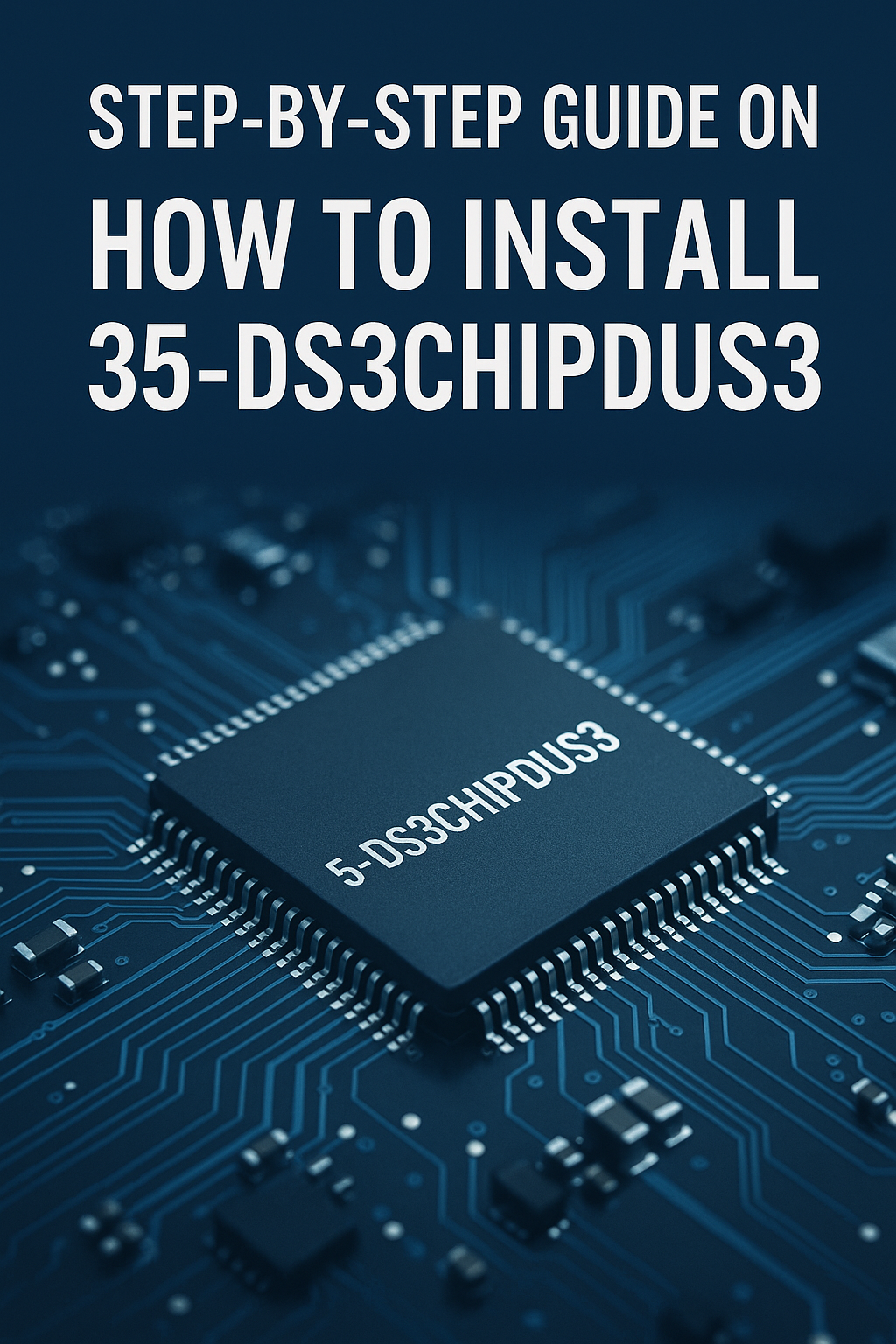In the world of advanced hardware configuration and embedded systems, knowing how to install 35-ds3chipdus3 can be critical for developers, engineers, and tech enthusiasts. Whether it’s used for improving chip performance, managing firmware updates, or enabling system features, this installation process must be handled with precision and care. This article offers a detailed, practical, and reliable walkthrough of installing 35-ds3chipdus3, while also exploring its uses, compatibility concerns, and post-installation practices.
Let’s dive into a complete understanding of this process from start to finish.
What is 35-ds3chipdus3?
The term 35-ds3chipdus3 is typically used to identify a unique chip configuration file, driver utility, or embedded firmware required to enable or optimize specific hardware components. It’s commonly found in advanced or specialized devices such as:
-
Custom-built PCs with DS3 chipsets
-
Embedded microcontroller systems
-
Robotics or automation boards
-
Development platforms and firmware simulators
Unlike typical drivers or software that can be installed with a few clicks, installing 35-ds3chipdus3 may involve manual configuration and direct interaction with hardware layers.
Why is Installing 35-ds3chipdus3 Important?
Many modern devices rely on accurate chip drivers or firmware updates to work efficiently. Installing 35-ds3chipdus3 can lead to:
-
Better performance for DS3-based chipsets
-
Advanced feature unlocking for developer boards
-
Bug fixes and security enhancements in firmware
-
Compatibility improvements between hardware and OS
-
Access to experimental or test-level chip capabilities
Neglecting this installation may leave your hardware underperforming or incompatible with modern tools.
Key Requirements Before Installation
Before you proceed with installing 35-ds3chipdus3, it’s crucial to prepare your system and environment properly.
Hardware Compatibility
-
DS3-based motherboard or embedded device
-
Flashable memory unit or BIOS support
-
64-bit processor architecture preferred
Software Prerequisites
-
OS compatibility (Windows 10/11, Ubuntu 20.04+, or Fedora)
-
Admin or root access
-
Necessary chip SDKs or installation libraries
-
File decompression tool (WinRAR, 7-Zip, tar)
-
Device-specific drivers or kernel headers
Backup and Safety
-
Full system backup or restore point
-
Stable power source or UPS
-
Anti-virus temporarily disabled (if interfering with drivers)
How to Install 35-ds3chipdus3 on Windows Systems
For users operating on Windows machines, follow these step-by-step instructions.
Step 1: Download the Official Installer
Visit the official website or trusted hardware platform associated with your chip. Locate the correct version of 35-ds3chipdus3 based on:
-
Chip model number
-
Windows version
-
32-bit or 64-bit architecture
Download and save the file to your desktop or installation folder.
Step 2: Extract the Files
Using 7-Zip or WinRAR, extract the compressed .zip or .rar package. Look for these essential files:
-
install.batorsetup.exe -
ReadMe file or installation guide
-
Driver
.inffiles
Step 3: Launch Installer as Administrator
Right-click on setup.exe and choose “Run as administrator.” Follow the guided installer steps. In some cases, you may need to approve a digital signature or override driver warnings.
Step 4: Reboot and Finalize Setup
After installation, restart your PC. On boot, your system should recognize and activate the 35-ds3chipdus3 driver or firmware component.
To confirm, check the Device Manager for your chip device and ensure no yellow warning signs are present.
How to Install 35-ds3chipdus3 on Linux
Linux users often deal directly with hardware layers and will find more flexibility in installing 35-ds3chipdus3 manually.
How to Install 35-ds3chipdus3 on Embedded Systems
If you’re working with boards like Raspberry Pi, Jetson Nano, or STM32-based systems, the installation approach will be slightly different.
Step 1: Format Boot Media
Use a tool like Balena Etcher or the terminal to format and flash the system image:
Step 2: Insert into Device and Power Up
Insert the microSD or USB into your device. Connect to power and serial monitor (if needed) to track the boot logs.
Step 3: Access Firmware Console
You may need to access U-Boot or another bootloader to activate or apply the firmware properly:
run update_firmware
Each embedded board may have unique commands, so always refer to its official documentation.
Troubleshooting Installation Issues
Installation Not Starting
-
Check for admin/root access
-
Re-download the installer if corrupted
-
Ensure your OS version is supported
Device Not Recognized After Installation
-
Try a manual driver update
-
Roll back to previous driver
-
Update BIOS or chipset firmware
Linux Errors with Modules
-
Check
dmesglogs -
Recompile driver with correct kernel headers
-
Use
modprobeto load driver manually
Post-Installation Tips
After successful installation of 35-ds3chipdus3, ensure optimal performance by following these steps:
-
Check for regular updates from the firmware provider
-
Monitor hardware health through diagnostic tools
-
Enable only necessary modules to prevent conflicts
-
Keep a backup image of working firmware
When Not to Install 35-ds3chipdus3
Avoid proceeding with installation if:
-
You’re unsure about the chip compatibility
-
You don’t have a verified installer
-
Your device is functioning normally and doesn’t require updates
-
You lack recovery tools or experience with firmware flashing
Read also: How SEO Experts at Garage2Global Are Transforming Online Business Visibility
Summary and Conclusion
Understanding how to install 35-ds3chipdus3 is essential for maximizing the capabilities of systems that rely on DS3 chipsets or related firmware. Whether you’re managing Windows drivers, configuring Linux modules, or flashing embedded boards, this guide offers a clear, actionable approach to safely and effectively complete the installation.
Always proceed with caution, verify your sources, and ensure system backups are in place. With the right preparation and careful execution, installing 35-ds3chipdus3 can unlock powerful features, improve compatibility, and optimize your system’s performance.
